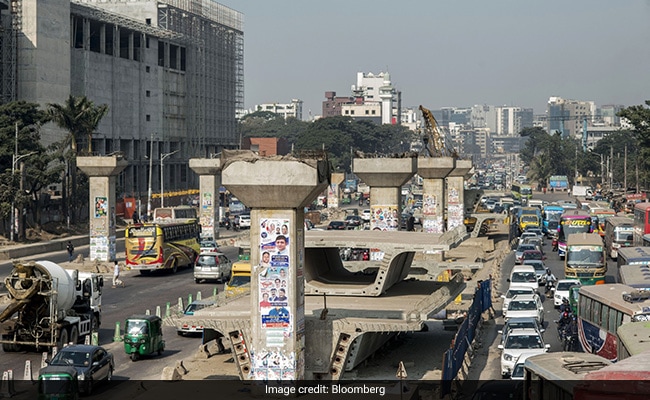One Of World’s Most Crowded Cities Gets First Mass-Transit Rail

Eventually it will cut through the city to the financial district of Motijheel in the south.
Bangladesh’s capital is about to get its first metro rail, a Japanese-funded project that aims to ease commuting in one of the most congested cities in the world.
A section of the 20-kilometer (12.427 miles) urban rail project, known as Line 6, will be inaugurated by Prime Minister Sheikh Hasina Wednesday. The line connects the northern zone of Dhaka to a hub of government offices and hospitals in the middle for now. Eventually it will cut through the city to the financial district of Motijheel in the south.
While the project is likely to bring significant changes to how people travel in Dhaka, its inauguration will also give some much-needed political mileage to Hasina’s government. With elections expected in January 2024, the leader and her party are under pressure as the South Asian nation’s foreign currency reserves dwindle and it battles inflation and energy crises.
In Dhaka, with 10.3 million people packed in 305 square kilometers (117.76 square miles), the average driving speeds have dropped to less than 7 kilometers (4.3496 miles) an hour right now from 21 kilometers an hour 10 years ago. Given the current trends, a World Bank report has estimated it could drop as low as 4 kilometers an hour, slower than walking.
“It’s an extremely important development for a city like Dhaka,” Martin Rama, a consultant with the World Bank’s presidency and former regional chief economist for South Asia, said in an interview. “If you look at the case of India in many cities, it has changed a lot the way people go to work. It’s a safe means of transportation, for instance, for women, which in South Asia is not trivial.”
At the same time, Rama said it would be “naive to think that congestion problems will go away” immediately because every time a country builds public transport infrastructure and adds more capacity, 90-95% of the freed up road space is taken up by additional traffic.
Traffic congestion wastes about 3.2 million working hours each day and costs Bangladesh’s economy billions of dollars every year. Dhaka is the seventh least livable in a list of 172 cities in the world on the Economist Intelligence Unit’s Global Livability Index for 2022.
“The bigger your city is, the more time you spend typically commuting,” said Rama. “So it’s a congestion cost that detracts from what the city has to offer.”
Bangladesh approved 219.85 billion taka ($2.1 billion) fund for the Line 6 project in 2012, with Japan providing 165.95 billion taka at the time. The cost later escalated to 334.72 billion taka as the authorities added a new section linking the metro rail to Kamalapur, the central railway station that connects Dhaka and the rest of the country.
Japan is also funding two other urban railway lines in Dhaka. When completed, three metro lines are projected to carry two million passengers daily, according to Japan International Cooperation Agency’s website.
The Dhaka metro rail follows six months after Hasina inaugurated the country’s longest river bridge, spanning over 6 kilometers over the Padma River. That is expected to connect 80 million people – half the country’s population – linking the southwest to the northeast.
(This story has not been edited by NDTV staff and is auto-generated from a syndicated feed.)
Featured Video Of The Day
On His 57th Birthday, Salman Khan Greets Fans From His Balcony
For all the latest world News Click Here
